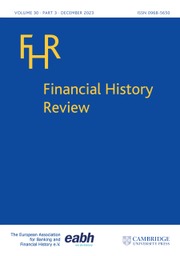Crossref Citations
This article has been cited by the following publications. This list is generated based on data provided by
Crossref.
Stringham, Edward
2003.
The extralegal development of securities trading in seventeenth-century Amsterdam.
The Quarterly Review of Economics and Finance,
Vol. 43,
Issue. 2,
p.
321.
Floud, Roderick
and
Johnson, Paul
2004.
The Cambridge Economic History of Modern Britain.
Carles Maixé-Altés, J.
and
Iglesias, Emma M.
2009.
Domestic monetary transfers and the inland bill of exchange markets in Spain (1775–1885).
Journal of International Money and Finance,
Vol. 28,
Issue. 3,
p.
496.
Poitras, Geoffrey
2009.
Vinzenz Bronzin’s Option Pricing Models.
p.
487.
Poitras, Geoffrey
2010.
Encyclopedia of Quantitative Finance.
Carlos, Ann M.
and
Neal, Larry
2011.
Amsterdam and London as financial centers in the eighteenth century.
Financial History Review,
Vol. 18,
Issue. 1,
p.
21.
Quinn, Stephen
and
Roberds, William
2012.
The Bank of Amsterdam Through the Lens of Monetary Competition.
SSRN Electronic Journal,
Flood, Mark D.
2012.
A Brief History of Financial Risk and Information.
SSRN Electronic Journal,
Stringham, Edward Peter
2014.
Extending the Analysis of Spontaneous Market Order to Governance.
Atlantic Economic Journal,
Vol. 42,
Issue. 2,
p.
171.
Quinn, Stephen
and
Roberds, William
2014.
Explaining Monetary and Financial Innovation.
Vol. 39,
Issue. ,
p.
283.
Flood, Mark D.
2014.
Handbook of Financial Data and Risk Information I.
p.
8.
Brose, Margarita S.
and
Flood, Mark D.
2014.
Handbook of Financial Data and Risk Information I.
p.
3.
Santarosa, Veronica Aoki
2015.
Financing Long-Distance Trade: The Joint Liability Rule and Bills of Exchange in Eighteenth-Century France.
The Journal of Economic History,
Vol. 75,
Issue. 3,
p.
690.
Schwarzberg, Raphaelle
2016.
The openness of the London Goldsmiths’ Company in the second half of the seventeenth century: an empirical study.
Financial History Review,
Vol. 23,
Issue. 2,
p.
245.
Kahn, Charles
Quinn, Stephen
and
Roberds, William
2016.
Central Banks at a Crossroads.
p.
563.
Costabile, Lilia
2016.
Antonio Serra and the Economics of Good Government.
p.
166.
2017.
Respectable Banking.
p.
88.
BROWN, CARYS
2017.
MILITANT CATHOLICISM, INTERCONFESSIONAL RELATIONS, AND THE ROOKWOOD FAMILY OF STANNINGFIELD, SUFFOLK, c. 1689–1737.
The Historical Journal,
Vol. 60,
Issue. 1,
p.
21.
Vedoveli, Paula
2018.
Information brokers and the making of the Baring crisis, 1857–1890.
Financial History Review,
Vol. 25,
Issue. 3,
p.
357.
't Hart, Marjolein
Brandon, Pepijn
and
Sánchez, Rafael Torres
2018.
Introduction: maximising revenues, minimising political costs – challenges in the history of public finance of the early modern period.
Financial History Review,
Vol. 25,
Issue. 1,
p.
1.




